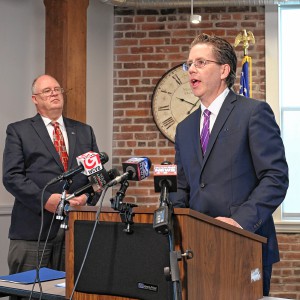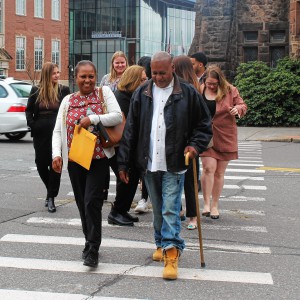Guest columnist William Lambers: Veterans Day and the noble quest for peace

mactrunk mactrunk
| Published: 11-11-2023 6:00 AM |
Imagine what Lt. A.J. Roemmick was thinking as he left the trenches in France to attack German troops on Nov. 11, 1918. World War I was still raging.
As Roemmick entered the “no-man’s land” that separated the American forces from enemy German forces, any moment could be his last. So many men had lost their lives in World War I, the most brutal conflict in history at that point.
While bravely advancing through no-man’s land, Roemmick suddenly heard a noise that was not gunfire. It was a bugle sounding. The rapid footsteps of a runner could then be heard. Runners were soldiers who carried messages during World War I.
“A runner came and told us the armistice had been signed,” Roemmick wrote in a letter to his mother printed by the St. Louis Post-Dispatch.
The war was over! Roemmick went from what he thought would be almost certain death to jubilation in just a matter of seconds.
At 11 a.m. on Nov. 11, 1918, the Armistice took effect that ended the fighting of World War I. That is the origin of Veterans Day, originally known as Armistice Day. It is a day to celebrate peace and the men and women who have fought so bravely for it over many years.
For some families there was a lifetime of sorrow for those lost in the war. My great uncle, Ira Pitzer, was killed in France on Nov. 3, 1918, just eight days before the Armistice. He never got to experience the peace he was fighting for.
After the Armistice it was hoped that the horror of war would not be repeated. Even though the major fighting of World War I had ended with the Armistice, there was still the enemy of hunger. War always leads to food shortages.
Article continues after...
Yesterday's Most Read Articles
 Greenfield homicide victim to be memorialized in Pittsfield
Greenfield homicide victim to be memorialized in Pittsfield
 1989 homicide victim found in Warwick ID’d through genetic testing, but some mysteries remain
1989 homicide victim found in Warwick ID’d through genetic testing, but some mysteries remain
 As I See It: Between Israel and Palestine: Which side should we be on, and why?
As I See It: Between Israel and Palestine: Which side should we be on, and why?
 Softball: Greenfield puts up 9-spot in the 8th inning to knock off rival Turners 11-2 in extra-inning thriller (PHOTOS)
Softball: Greenfield puts up 9-spot in the 8th inning to knock off rival Turners 11-2 in extra-inning thriller (PHOTOS)
 DA to announce breakthrough in 1989 unsolved homicide in Warwick
DA to announce breakthrough in 1989 unsolved homicide in Warwick
 Former Greenfield man granted new trial after 1995 murder conviction, walks free
Former Greenfield man granted new trial after 1995 murder conviction, walks free
U.S. soldiers and civilians of the American Relief Administration carried on lifesaving missions after the 1918 Armistice. Their task was to prevent starvation in the war-torn countries. Lt. George Harrington led a hunger relief mission in Riga, the capital of Latvia, and helped negotiate a cease-fire between forces fighting within the country. A report read, “Lieutenant Harrington deserves the greatest credit. He has prevented wholesale murder at Riga.”
There was the hope that the Armistice ended the “war to end all wars.” President Calvin Coolidge referred to Nov. 11 as “peace day.” Coolidge believed that Armistice Day, which was achieved through the sacrifice of many people and nations, should unite the world toward peace.
Coolidge wrote in 1924, “Celebrated in many lands and by many peoples, it will remind them of their united efforts and common sacrifices in the bitterest crisis of civilization’s history. It will always recall the fact that humanity has far more reason for unity than for discord. It will emphasize the common ideals and aspirations which must at last draw all men into fraternity and set their feet in the way of peace.”
Tragically a bigger world war would follow two decades later and so many other conflicts, too. Right now there are wars taking place in Ukraine and more recently the Israel-Hamas war.
But there still remains the hope for a world at peace, where people can live free from fear and aggression. Our veterans have sacrificed to keep us free and from war reaching our shores.
On Armistice Day, or Veterans Day, let’s honor their sacrifice and think of ways we can further peace in the world.
We must encourage nations to resolve their differences peacefully. We can support hunger relief missions to prevent nations from suffering the chaos of food shortages. Food is an essential requirement for peace.
We must not let the dream of Armistice Day vanish. We must keep up the hope for a world at peace.
William Lambers is the author of “The Road to Peace” and partnered with the U.N. World Food Program on the book “Ending World Hunger.

 Guest columnist Gene Stamell: We know what we know
Guest columnist Gene Stamell: We know what we know Michelle Caruso: Questions candidate’s judgment after 1980s police training incident
Michelle Caruso: Questions candidate’s judgment after 1980s police training incident Kathy Sylvester: Vote for expertise on May 6
Kathy Sylvester: Vote for expertise on May 6 Shirley and Mike Majewski: Vote for Blake Gilmore
Shirley and Mike Majewski: Vote for Blake Gilmore
